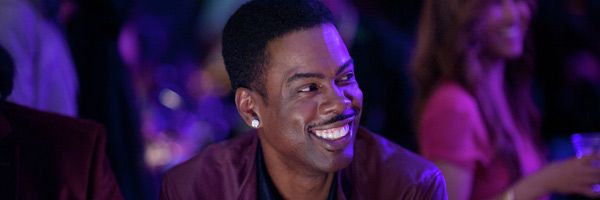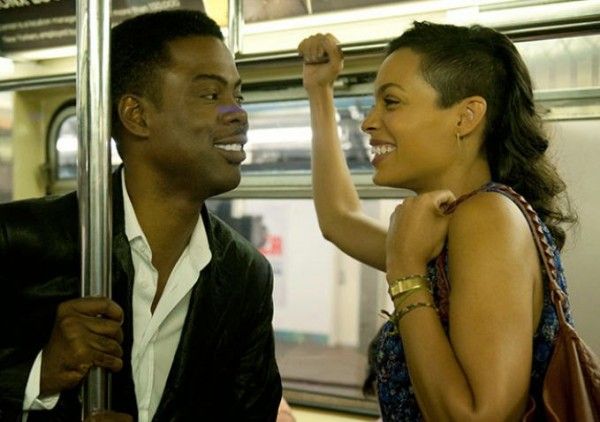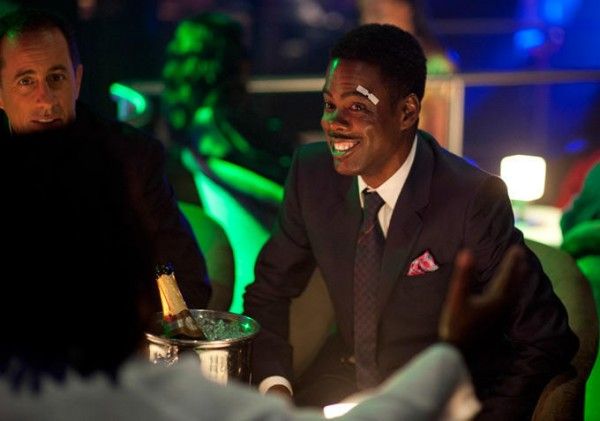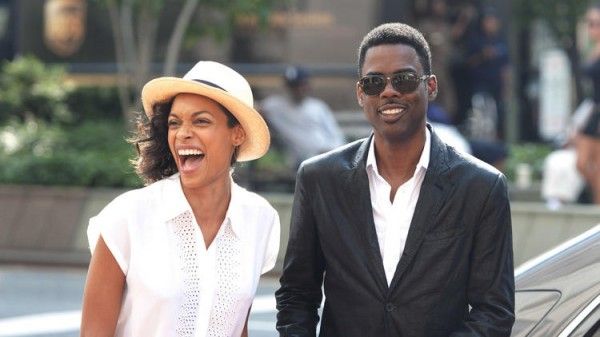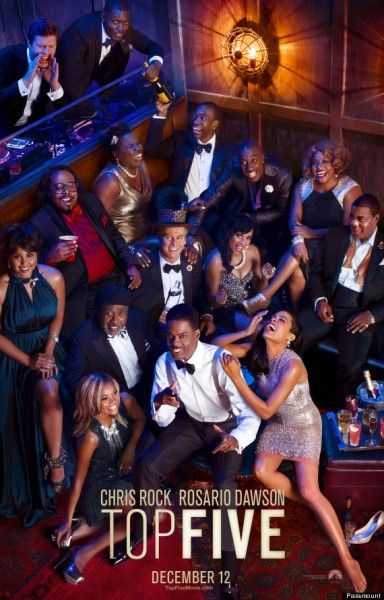There’s more than one way for a stand-up comedian to do a bit, and there’s more than one way for an actor to express frustration with his profession. Chris Rock is one of the most insightful entertainers working today, and in the press he’s been doing for his new movie Top Five, he’s commented on race, politics, current events, comedy, and much more. However, his new film is mostly concerned with fame, performance, and the trappings of both. Although the story is built on a flimsy premise and its constraints create an awkward resolution, Rock has filled his picture with his sharp comedy that skewers celebrity and pride.
Andre Allen (Rock) is a stand-up comedian who became a Hollywood sensation with his Hammy franchise where he played a guy in bear suit who fought crime. But now Andre wants to be taken “seriously”, and is out promoting his new drama, Uprize, which is about a Haitian slave rebellion. He reluctantly agree to spend the day with Chelsea Brown (Rosario Dawson), a New York Times writer doing a profile piece, and Andre takes her through the corners of his life going from where he grew up to the film’s press junket and the places in between. As they learn more about each other, he discovers not only that he might have a deeper connection with Chelsea than his reality star fiancée Erica Long (Gabrielle Union), but also that his desire to do drama is more of an escape from comedy than a pursuit of artistic truth.
In the opening scene, Andre remarks to Chelsea that “Sometimes a movie is just a movie,” but we already know that’s not true, especially with a stand-up comedian like Rock who isn’t going to make mindless entertainment. Following the first scene, the satire comes fast and furious as Rock skewers our celebrity-obsessed culture right down to the Q&A audiences who cheer when someone asks, “When will there be another Hammy 4?” For someone as insightful as Rock, it seems like his frustration stems from people being willfully deluded, whether they’re asking hack questions or, as in the case of Andre, blaming his alcoholism for why he’s unwilling to go back to comedy because he’s afraid he won’t be funny without booze.
In their conversations together, Andre and Chelsea place an emphasis on “rigorous honesty”, which is the core of observational comedy. It's about pinpointing an intangible, giving voice to it, and finding a universal connection that others missed. Rock is one of the smartest comics working today, and Top Five is his opportunity to work a routine into a narrative film and use a film to work a dramatic character arc into a routine. It’s a thoughtful melding of the two, and held together by Rock’s unique personality.
Rock comes off, as he does in his standup, as bitingly cute. Although there’s some serious drama, especially a surprisingly sympathetic scene featuring Union, the comedy in Top Five mirrors the big, toothy smile and irreverent tone of Rock’s comic persona. The Hammy films comes off as Rock’s worst nightmare, or at least the worst fate that can befall a serious comedian—being reduced to one silly character. Rock has avoided this fate, but a guy in a bear suit firing a machine gun and shouting “It’s Hammy time!” is both funny and understandably terrifying if you ever want to be taken seriously.
Andre miscalculates what “serious” means, and this also opens the door for Rock to criticize comics who give po-faced performances for the wrong reasons. No one likes Uprize not because the material isn’t worthwhile, but because it’s clearly a vanity project where Andre’s career trajectory and celebrity reduce the drama down to a punchline. Over the course of Top Five, we get to see Andre’s Sullivan’s Travels realization where he discovers that laughter is more potent than egocentric heavy drama.
I don’t think Rock is anti-drama or saying that comedians shouldn’t take on dramatic roles, but he is pointing out that pretense needs to be discarded. Whether it’s the pretense of a celebrity wedding, softball questions from journalists like “Were you the class clown growing up?” or the notion that Andre can’t be funny unless he’s drinking, Rock has no patience for it, but he turns it into a joke in a way that only he can. Top Five is intended as a celebration of honesty no matter how ridiculous or painful that honesty can be.
Which is why it’s a bit of shame that the premise of the story betrays that honesty. We’re meant to believe that a major profile piece for any publication, let alone the New York Times, to promote a film is being done the day of the film’s release. Additionally, condensing the events of the movie—aside from a few flashback scenes—down to a single day reduces the credibility of Andre and Chelsea’s relationship even though Rock would like us to believe that “rigorous honesty” can quickly create a deep connection.
The relationship between Andre and Chelsea is almost a sop to the audience and playing into the pretense that people will only connect with a character if there’s a love story (Rock’s Head of State falls into the same trap). Dawson and Rock are fine together, but they’re not the heart of Top Five. The heart of Top Five is when it cuts through the bullshit, and speaks freely with the loud, obscene, and exuberant voice that only Chris Rock can provide.
Rating: B

